
TELOPEA
Scope & Guideline
Advancing the Frontiers of Plant Science and Ecology
Introduction
Aims and Scopes
- Taxonomy and Systematics:
The journal emphasizes the classification and systematics of a wide variety of plant groups, including angiosperms, bryophytes, and ferns. Many papers focus on the description of new species, which contributes to the understanding of plant biodiversity. - Flora and Fauna Conservation:
Research published in TELOPEA often addresses conservation issues, documenting the presence and conservation status of endemic and rare species. This focus highlights the journal's commitment to biodiversity preservation. - Ecological Studies:
The journal includes studies that explore the ecological relationships and habitats of various plant species, providing insights into their distributions and interactions with other organisms in their ecosystems. - Phylogenetics and Molecular Studies:
Recent publications indicate a growing interest in molecular phylogenetic studies that analyze the evolutionary relationships among plant species, enhancing the understanding of plant lineage and diversity. - Regional Plant Studies:
TELOPEA showcases research that is often specific to certain geographic areas, notably Australia and nearby regions, fostering a deeper understanding of the flora in these regions.
Trending and Emerging
- New Species Descriptions:
There is a strong trend towards the description of new plant species, especially from Australia and the Pacific Islands. This trend underscores the ongoing exploration and documentation of biodiversity in understudied regions. - Molecular Phylogenetics:
Recent publications have increasingly utilized molecular techniques to study the phylogenetics of plant groups. This shift towards molecular approaches is enhancing the understanding of evolutionary relationships among species. - Conservation and Endemism:
Research focusing on the conservation status of rare and endemic species is gaining traction. Articles that assess the ecological status and threats to specific plant populations reflect a growing urgency for conservation efforts. - Ecological Interactions:
There is a burgeoning interest in examining the ecological interactions between plant species and their environments. Studies that explore plant community dynamics and habitat requirements are increasingly common. - Utilization of Citizen Science and Technology:
The incorporation of citizen science data and technological advancements (like GIS and remote sensing) in botanical research is emerging. This trend indicates a shift towards more collaborative and tech-driven methodologies in biodiversity research.
Declining or Waning
- Historical Taxonomy:
Research focusing solely on historical or archival taxonomy of plant species appears to be decreasing. Papers that do not contribute new findings or insights into current conservation issues are less frequently published. - General Flora Lists:
Publications that merely compile extensive lists of flora without substantial taxonomic revisions or ecological insights seem to be less common. The journal appears to prioritize studies that provide novel contributions to plant science. - Non-native Species Studies:
There is a noticeable reduction in studies focusing on non-native or invasive plant species, possibly due to the journal's increasing emphasis on native flora and conservation efforts.
Similar Journals
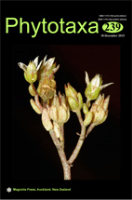
Phytotaxa
Fostering Global Insights into Plant EvolutionPhytotaxa, published by MAGNOLIA PRESS, is an esteemed journal in the fields of Plant Science and Ecology, Evolution, Behavior and Systematics. Established to cater to the growing need for high-quality research dissemination in botany, this journal presents the latest findings in plant taxonomy, systematics, and biodiversity. With its H-Index reflecting significant academic influence, and recognized as Q2 in Plant Science and Q3 in Ecology by Scopus, it stands as a reputable source for scholars and practitioners alike. The journal operates without open access restrictions, allowing for a wider reach to its audience. Positioned in New Zealand, Phytotaxa has been pivotal since its inception, contributing to the global understanding of plant diversity and ecology from 2010 to 2024. Its rigorous peer-review process ensures the high quality of published articles, making it an essential resource for researchers, professionals, and students dedicated to advancing the field of botany.
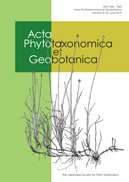
Acta Phytotaxonomica et Geobotanica
Bridging Plant Science with Ecological InsightsActa Phytotaxonomica et Geobotanica, published by the Japanese Society for Plant Systematics at the University of Tokyo, serves as a vital platform for advancing research in the fields of ecology, plant science, and biodiversity. With an ISSN of 1346-7565 and an E-ISSN of 2189-7042, this journal not only provides a comprehensive evaluation of current topics within these categories but also addresses the intricate connections between plant systems and their ecological environments. Although currently not open access, the journal is essential for researchers aiming to publish cutting-edge findings, contributing significantly to its classification within the Q3 quartile across multiple disciplines, including Ecology and Plant Science. With an ambitious focus on enhancing the understanding of plant taxonomy and geography through a convergence of research periods from 2014 to 2024, Acta Phytotaxonomica et Geobotanica plays a pivotal role in fostering academic discourse and innovation in plant systematics. Its geographical foundation in Japan enriches the journal's unique perspective on regional flora, making it an indispensable resource for students, researchers, and professionals in the field.

European Journal of Taxonomy
Exploring the dynamic world of species classification.The European Journal of Taxonomy is a distinguished open access journal, published by the MUSEUM NATL HISTOIRE NATURELLE in France, dedicated to the rich and dynamic field of taxonomy, ecology, and systematics. Since its inception in 2011, this journal has aimed to provide a platform for the dissemination of high-quality research and innovative methods relevant to the study of biodiversity and species classification. With a commendable Q2 ranking in the Ecology, Evolution, Behavior and Systematics category as of 2023, the journal ranks 380 out of 721 in Scopus, highlighting its pivotal role in advancing scientific knowledge in these essential areas. Researchers and students alike will find valuable resources and contributions that address pressing ecological and evolutionary questions from 2015 to 2024. By promoting open access, the European Journal of Taxonomy ensures that vital research is accessible to a broader audience, fostering collaboration and discourse among professionals striving to enhance our understanding of the natural world.

KEW BULLETIN
Elevating Academic Discourse in Plant Science and EcologyKEW BULLETIN is an esteemed academic journal dedicated to the fields of plant science and ecology, published by SPRINGER LONDON LTD. With an ISSN of 0075-5974 and E-ISSN 1874-933X, it has been a significant resource for researchers and scholars since its inception in 1993, currently covering converged years up to 2024. The journal holds a notable position with a 2023 category quartile ranking of Q3 in Ecology, Evolution, Behavior and Systematics and Q2 in Plant Science, highlighting its contributions to advancing knowledge in these critical areas. Its Scopus ranks—#333 in Plant Science and #475 in Ecology, showcasing a percentile rank of 35th and 34th respectively—further authenticate its standing among peers. While KEW BULLETIN is not an open-access publication, it offers valuable research findings, insightful reviews, and fosters academic discourse, making it an essential platform for professionals, students, and researchers passionate about understanding the intricacies of plant life and ecological systems. Located at 236 Grays Inn Rd, 6th Floor, London WC1X 8HL, England, the journal remains committed to disseminating high-quality research and supporting the scientific community.
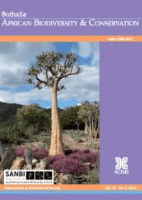
BOTHALIA
Exploring the intricacies of life on Earth.BOTHALIA is a prominent open-access journal dedicated to advancing the fields of Ecology, Evolution, Behavior, and Systematics, as well as Plant Science. Published by the South African National Biodiversity Institute (SANBI), this journal has been disseminating valuable research since 1978 and has embraced open access since 2014 to enhance the visibility and accessibility of scientific knowledge. With an ISSN of 0006-8241 and E-ISSN of 2311-9284, BOTHALIA plays a pivotal role in promoting biodiversity research in South Africa and beyond. In the recent Scopus rankings, it has been positioned at Q4 in both relevant categories, highlighting its contributions within the broader scientific community, despite being in its growing phase amidst competitive rankings. The journal aims to publish high-quality articles that address critical issues in biodiversity and ecological sciences, making it an essential resource for researchers, professionals, and students committed to understanding and managing our planet's biological heritage.
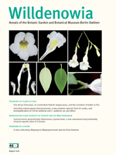
Willdenowia
Connecting researchers to the heart of botanical science.Willdenowia is a prestigious scientific journal published by the Botanischer Garten & Botanische Museum Berlin-Dahlem, dedicated to advancing the field of botany and plant sciences. With an ISSN of 0511-9618, this journal has established itself as a crucial platform for researchers, practitioners, and students interested in ecology, evolution, behavior, systematics, and plant science. The journal boasts an impactful reputation, evidenced by its impressive Q1 and Q2 quartile rankings in Plant Science and Ecology, Evolution, Behavior and Systematics respectively, as well as notable Scopus rankings, placing it within the top quartiles of its categories. Although access is not open, articles published in Willdenowia contribute significantly to the global body of botanical research, making it an essential resource for anyone looking to deepen their understanding of plant biology and related ecological disciplines. The journal has continuously evolved since its inception and aims to facilitate interdisciplinary collaboration and knowledge dissemination in the life sciences.

TAXON
Advancing the frontiers of biodiversity research.TAXON is a premier international journal published by Wiley, dedicated to the fields of ecology, evolution, behavior, systematics, and plant science. With a distinguished history since 1970 and a commitment to advancing knowledge in the biological sciences, TAXON has been recognized in the Q1 category for both its ecological and plant science contributions as of 2023. The journal boasts an impressive Scopus ranking, placing it in the 76th percentile for Ecology, Evolution, Behavior and Systematics and the 74th percentile for Plant Science, highlighting its significance and impact within these domains. While not an open-access publication, TAXON offers a wealth of high-quality research articles, reviews, and discussions, making it an indispensable resource for researchers, professionals, and students alike seeking to deepen their understanding of biodiversity and systematics. For access to its cutting-edge research, readers can follow the journal's updates and contributions online.

NOVON
Innovating Insights in Ecology and EvolutionNOVON is a premier scholarly journal published by the Missouri Botanical Garden, focusing on the intersection of botany and taxonomy, particularly within the fields of Ecology, Evolution, Behavior, and Systematics. Since its inception in 1994, NOVON has established itself as a vital resource for researchers seeking insight into plant science and related disciplines, reflected in its Q3 ranking in 2023 within both Ecology and Plant Science categories. With a commitment to advancing knowledge in these dynamic fields, the journal serves as a platform for innovative studies and significant findings. Although it currently operates without an open-access model, NOVON provides valuable contributions to the scientific community, fostering collaboration and dialogue among professionals and students alike. Located in St. Louis, Missouri, the journal plays a crucial role in enhancing our understanding of biodiversity and plant evolution, supporting the overarching objectives of conservation and ecological research.

PHYTON-ANNALES REI BOTANICAE
Fostering innovation in the realm of plant biology.PHYTON-ANNALES REI BOTANICAE is a distinguished journal dedicated to the fields of plant science and ecology, published by Ferdinand Berger Soehne. With its origins tracing back to 1994, this journal has carved a niche in disseminating vital research findings and innovative studies pertaining to botany and environmental biology, despite its coverage being discontinued in Scopus since 2016. The journal's impact extends across various disciplines, reflected in its rankings within the categories of Agricultural and Biological Sciences and Environmental Science, underscoring its commitment to advancing knowledge in plant sciences. While it is not an open-access journal, its rigorous peer-review process ensures high-quality research that is valuable for researchers, professionals, and students alike. Located in Horn, Austria, PHYTON serves as a pivotal platform for sharing significant contributions to the field, fostering a deeper understanding of plant biology and ecology.
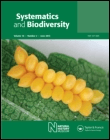
SYSTEMATICS AND BIODIVERSITY
Exploring biodiversity's complexities for a sustainable future.Systematics and Biodiversity, published by Taylor & Francis Ltd, is a prominent academic journal that provides a vital platform for advancing research in the fields of ecology, evolution, and plant science. With an ISSN of 1477-2000 and an E-ISSN of 1478-0933, the journal has established itself as a reputable source of scholarly information since its inception in 2003, and continues to publish cutting-edge studies through 2024. Recognized for its rigorous peer-review process, it holds a prestigious position in academic circles, reflected by its Q2 ranking in Ecology, Evolution, Behavior and Systematics and Q1 ranking in Plant Science as of 2023. The journal's contributions are further characterized by its strong performance in Scopus rankings, placing it in the 69th and 68th percentiles in its respective categories. Researchers, professionals, and students alike will find invaluable insights and innovative methodologies within its pages, making Systematics and Biodiversity an essential resource for those dedicated to understanding the complexities of biological diversity and systematics. The journal's impact factors and commitment to high-quality research underscore its significance in shaping the future of ecological and botanical studies.